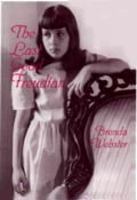
- 2000/208 pages
- Distributed for Holmes & Meier Publishers
Includes photographs
The Last Good Freudian
Hardcover: $24.95
ISBN: 978-08419-1395-0
The environment of New York City in the post-World War II era was one filled with new ideas and movements. The 1950s saw waves of Freudian disciples set up practices. In The Last Good Freudian, Brenda Webster describes what it was like to grow up in an intellectual and artistic Jewish family during this time.
Her father, Wolf Schwabacher, was a prominent entertainment lawyer whose clients included the Marx Brothers, Lillian Hellman, and Erskine Caldwell; her mother, Ethel Schwabacher, was a protégé of Arshile Gorky, his first biographer, and herself a well-known abstract expressionist painter.
Her father, Wolf Schwabacher, was a prominent entertainment lawyer whose clients included the Marx Brothers, Lillian Hellman, and Erskine Caldwell; her mother, Ethel Schwabacher, was a protégé of Arshile Gorky, his first biographer, and herself a well-known abstract expressionist painter.
In her memoir, Webster vividly evokes the social milieu of her childhood—her summers at the farm that was shared with free-thinking psychoanalyst Muriel Gardiner; the progressive school on the Upper East Side where students learned biology by caring for real babies; and the atmosphere of sexual liberation in which her mother presented her with a copy of Lady Chatterly's Lover on her thirteenth birthday.
Growing up within a society which held Freudian analysis as the new diversion, Webster was given early access to the analyst's couch; the history of mental illness in her mother's family kept her there. As a result, Freudian thought became something which was impossible for Webster to avoid. What unfolds in her narrative is both a personal history of analysis and a critical examination of Freudian practices.




